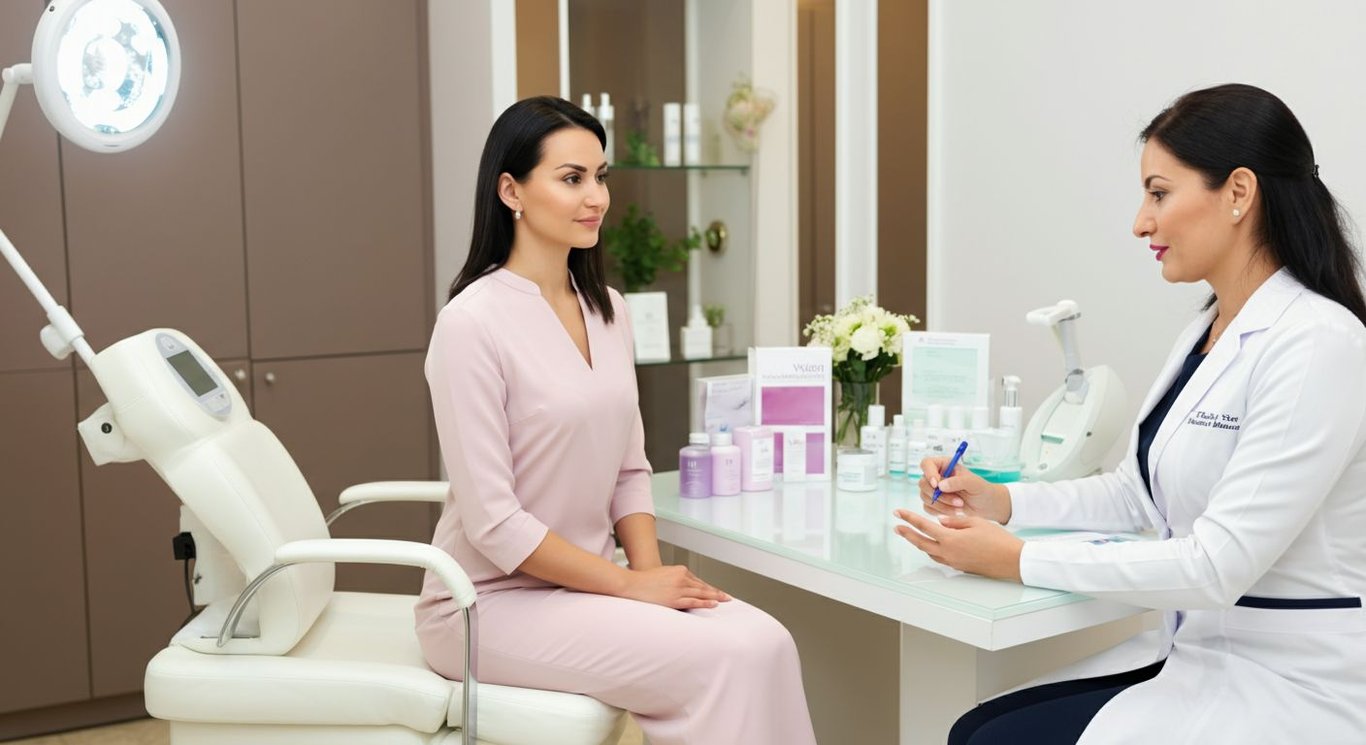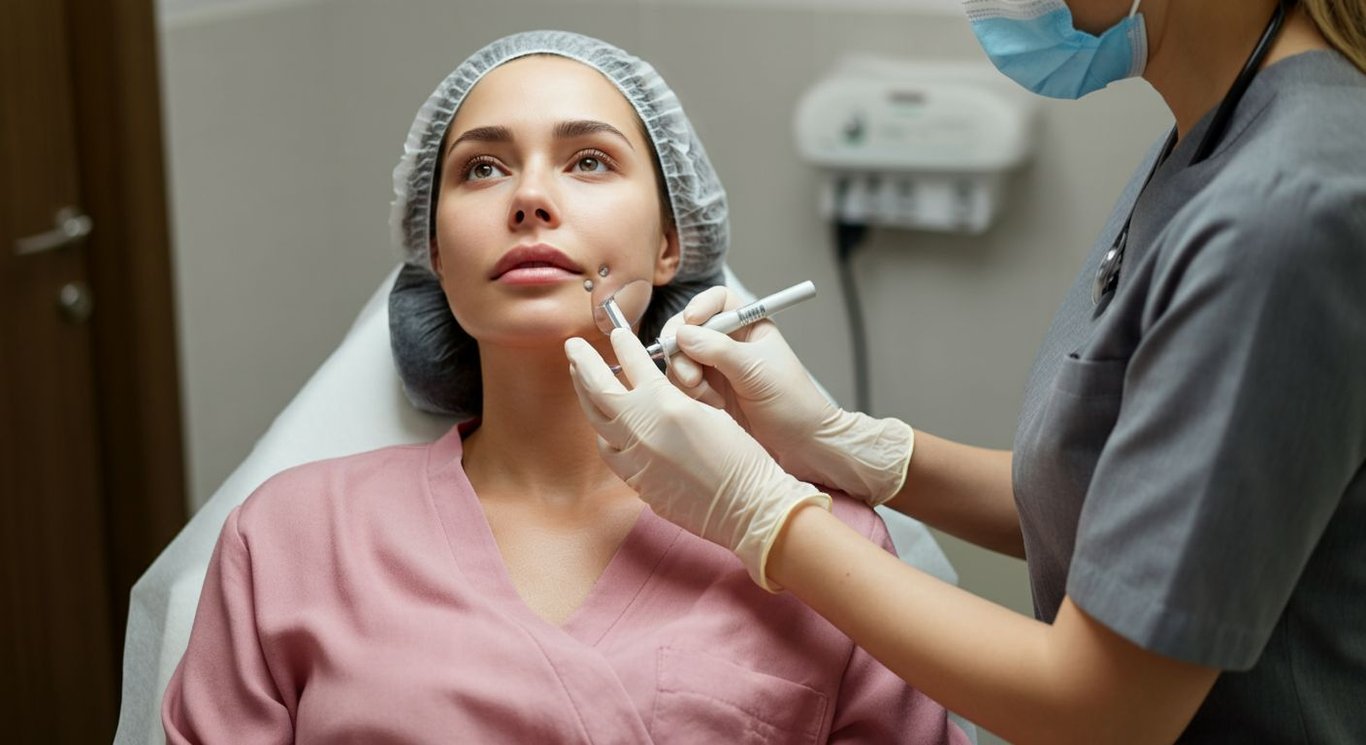Your Guide to Radiant Skin: Cosmetic Dermatology Unveiled
Discover radiant skin with Cosmetic Dermatology techniques, enhancing your beauty the expert way!
This blog provides an in-depth exploration into achieving radiant skin through a variety of cosmetic dermatology procedures and tips. From understanding your skin's unique needs to exploring the latest in aesthetic technology, learn how to unlock your skin's full potential with insights from leading dermatologists and the modern innovations available today.
Understanding Your Skin: A Dermatologist's Perspective
Deciphering Skin Types: A Personalized Approach
Dermatologists play a crucial role in assessing and categorizing various skin types, including oily, dry, combination, and sensitive. This evaluation involves a comprehensive analysis of factors such as pore size, hydration levels, and sensitivity to external elements. A dermatologist's expertise ensures that individuals receive tailored skin care recommendations, addressing specific concerns and optimizing skin health effectively. For instance, someone with oily skin will need a totally different routine than someone with very dry skin.
Key Steps in a Dermatologist's Skin Assessment
- Visual Examination: Close inspection of the skin's surface to identify irregularities, such as blemishes, redness, or discoloration.
- Tactile Assessment: Gently feeling the skin to gauge its texture, hydration level, and elasticity.
- Patient History: Gathering information about the patient's lifestyle, diet, and current skincare regimen to understand potential contributing factors to skin issues.
This thorough approach ensures that the dermatologist gains a holistic understanding of the patient's skin. Ultimately, the dermatologist then uses this data to create a regimen designed to achieve the best possible results. This might include advice on reducing wrinkles naturally.
Customizing Skin Care for Individual Needs
- Acne Treatment: Tailored plans that may include topical treatments, oral medications, or procedures like chemical peels, depending on the severity and type of acne.
- Anti-Aging Strategies: Personalized routines to combat signs of aging, incorporating retinoids, antioxidants, and possibly cosmetic procedures to rejuvenate the skin.
- Sensitive Skin Management: Gentle product recommendations and lifestyle adjustments to soothe and protect easily irritated skin, minimizing redness and discomfort.

Beyond Creams: Exploring Advanced Skin Care Procedures
The Science Behind Chemical Peels
Chemical peels are a transformative skincare solution, adept at exfoliating the skin's outermost layers to reveal a smoother, more radiant complexion. These treatments involve the application of a chemical solution, which varies in strength depending on the depth of exfoliation desired—ranging from superficial to deep peels. Aesthetic medicine increasingly recognizes chemical peels for their efficacy in treating fine lines, acne, and uneven skin tone. For example, Alpha Hydroxy Acid peels are great for exfoliation.
Benefits of Professional Chemical Peel Treatments
- Targeted Exfoliation: Precisely removes damaged skin cells, encouraging new cell growth and diminishing imperfections with clinical dermatology.
- Acne Reduction: Unclogs pores and reduces inflammation, leading to fewer breakouts and clearer skin.
- Improved Tone and Texture: Evens out skin tone and softens the appearance of scars, enhancing overall facial aesthetics.
The results from a professional chemical peel can be quite dramatic, with some individuals experiencing a significant reduction in the visibility of sun damage. It is important to follow the advice from your dermatologist about after-care. Sun protection is vital.
Hydrafacial Treatments: More Than Just a Facial
Hydrafacials represent a cutting-edge approach to skin rejuvenation, combining cleansing, exfoliation, extraction, hydration, and antioxidant protection in a single treatment. This non-invasive procedure utilizes a unique device to deliver these benefits, making it a popular choice for individuals seeking immediate results without downtime. Aesthetic medicine emphasizes hydrafacials for their ability to provide deep hydration and improve skin elasticity. This sets it apart from typical over-the-counter treatments. Many find that regular Hydrafacial treatments diminish the appearance of wrinkles naturally.
Key Advantages of Hydrafacial Treatments
- Deep Cleansing: Effectively removes impurities and dead skin cells, leaving the skin refreshed and revitalized.
- Intense Hydration: Infuses the skin with hydrating serums, improving moisture levels and overall skin health, offering solutions for dry skin.
- Customizable: Can be tailored with specific serums to address individual skin concerns, such as aging, hyperpigmentation, and acne, which makes it an affordable solution for skin rejuvenation.
Hydrafacial treatments are particularly beneficial for those looking to maintain a youthful appearance. Regular sessions can improve skin texture and tone, reducing the need for more invasive cosmetic procedures. Speak to a dermatologist about hydrafacial treatments.

The Science of Sun Protection: Essential Dermatological Advice
Decoding SPF: Choosing the Right Sunscreen for Your Skin
Understanding Sun Protection Factor (SPF) is crucial for effective sun defense. SPF indicates how well a sunscreen protects against UVB rays, the primary cause of sunburn. Dermatologists recommend using a broad-spectrum sunscreen with an SPF of 30 or higher to block 97% of UVB rays. However, it's vital to apply sunscreen generously and reapply every two hours, especially after swimming or sweating. Sun protection thereby combines an effective product with correct application. An important element of skin care is taking adequate sun protection while receiving cosmetic procedures.
Essential Steps for Optimizing Sunscreen Use
- Generous Application: Apply at least one ounce (about a shot glass full) to cover the entire body.
- Regular Reapplication: Reapply every two hours, or immediately after swimming or sweating, to maintain protection.
- Year-Round Use: Incorporate sunscreen into your daily routine, even on cloudy days, to protect against sun damage.
The regular and correct application of sunscreen is key to preventing premature aging and skin cancer. Protecting skin from sun exposure helps individuals reduce wrinkles naturally. Proper sunscreen habits form an important step in facial aesthetics.
Beyond SPF: Comprehensive Sun Protection Strategies
Sunscreen is a vital tool, but it's only one piece of the sun protection puzzle. Dermatologists advise combining sunscreen with other protective measures, such as seeking shade during peak sun hours (10 a.m. to 4 p.m.), wearing protective clothing (long sleeves, hats, and sunglasses), and avoiding tanning beds. Aesthetic medicine emphasizes these combined strategies to minimize sun damage and promote long-term skin health. Sun protection is helpful for preserving dry skin solutions. It's important to note that even the best sunscreen doesn't provide 100% protection; therefore a comprehensive approach is essential for clinical dermatology.
Additional Methods for Enhanced Sun Defense
- Protective Clothing: Wear tightly woven fabrics that cover the skin to block UV rays effectively.
- Wide-Brimmed Hats: Shield the face, neck, and ears from the sun, reducing the risk of sunburn and skin damage.
- UV-Protective Eyewear: Choose sunglasses that block 99-100% of UVA and UVB rays to protect the eyes and surrounding skin.
Unlock Your Skin's Potential: Innovations in Aesthetic Medicine
Laser Treatments for Skin Rejuvenation
Laser treatments represent a significant advancement in aesthetic medicine, offering precise solutions for various skin concerns, from reducing wrinkles to eliminating unwanted pigmentation. These procedures utilize concentrated beams of light to target specific areas of the skin, stimulating collagen production and promoting cellular turnover. Clinical dermatology recognizes laser technology for its ability to deliver noticeable improvements with minimal downtime. Laser treatments are helpful for individuals who want to consider best dermatologist for acne treatment.
Common Types of Laser Treatments
- Laser Resurfacing: Removes the outer layers of damaged skin to reveal smoother, younger-looking skin, often used to treat scars and deep wrinkles.
- IPL (Intense Pulsed Light): Targets pigmentation issues such as sunspots, age spots, and redness, resulting in a more even skin tone.
- Fractional Laser Therapy: Treats small sections of the skin at a time, promoting faster healing and minimizing risks compared to traditional laser resurfacing.
Microneedling: A Non-Invasive Approach to Skin Improvement
Microneedling has emerged as a popular non-invasive procedure for skin rejuvenation, employing tiny needles to create micro-injuries in the skin. This process stimulates the body’s natural healing response, boosting collagen and elastin production to improve skin texture, reduce scars, and minimize pore size. Often used in conjunction with serums that enhance the revitalizing and hydrating effects of the treatment. This offers individuals with limited time a way to rejuvenate their skin and improve their overall facial aesthetics.
The Microneedling Process: Step-by-Step
- Skin Preparation: The skin is cleansed, and a numbing cream is applied to minimize discomfort during the procedure.
- Microneedling Application: A device with fine needles is gently moved across the skin, creating micro-punctures.
- Serum Infusion: A specialized serum containing ingredients like hyaluronic acid or growth factors is applied to enhance the healing and rejuvenation process.
Laser and Microneedling Rejuvenation: Advanced Techniques for Radiant Skin
estethica employs advanced laser treatments to target wrinkles and pigmentation, promoting collagen production and cellular turnover. Microneedling procedures stimulate the body's natural healing response, boosting collagen and elastin for improved skin texture and reduced scarring.
estethica’s dermatologists are skilled in assessing various skin types to provide tailored skincare recommendations. They perform comprehensive skin analysis involving visual examination, tactile assessment, and patient history review to create customized treatment plans.
Personalized Skin Care Regimens & Sun Protection Expertise by estethica
estethica ensures patient safety and satisfaction through personalized skincare regimens and comprehensive sun protection strategies. Dermatologists offer essential advice on selecting the right sunscreen and combining it with protective measures to minimize sun damage.
estethica is dedicated to delivering an exceptional patient experience with customized treatments and attentive care. Professional after-care advice ensures long-term skin health and rejuvenation through continuous support and advanced insights.
Frequently Asked Questions
How can a dermatologist help me understand my skin better?
What are some advanced cosmetic procedures beyond basic skincare creams?
Why is daily sun protection essential for maintaining healthy skin?
How do laser treatments and microneedling help rejuvenate the skin?
Discover your path to healthy beauty with a personalized consultation at estethica.
📞 Call Now for a Free Consultation!